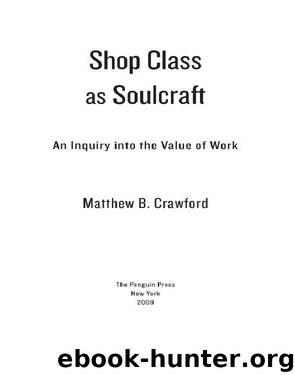Shop Class as Soulcraft by Matthew B. Crawford

Author:Matthew B. Crawford
Language: eng
Format: epub
Publisher: Penguin USA, Inc.
6
The Contradictions of the Cubicle
The popularity of Dilbert, The Office, and any number of other pop-culture windows on cubicle life attests to the dark absurdism with which many Americans have come to view their white-collar work. Absurdity is good for comedy, but bad as a way of life. It usually indicates that somewhere beneath the threshold of official notice fester contradictions that, if commonly admitted, would bring on some kind of crisis. What sort of contradictions might these be? To begin with, we are accustomed to think of the business world as ruled by an amoral bottom-line mentality, but in fact it is impossible to make sense of the office without noticing that it has become a place of moral education, where souls are formed and a particular ideal of what it means to be a good person is urged upon us.
This contradiction is perhaps rooted in a more basic one. Corporations portray themselves as results-based and performance-oriented. But where there isn’t anything material being produced, objective standards for job performance are hard to come by. What is a manager to do? He is encouraged to direct his attention to the states of minds of workers, and become a sort of therapist.
By way of contrast, consider the relationship between a machinist and his shop boss. The machinist makes his part, then hands it to the boss. Let us imagine the boss pulls his micrometer out of his breast pocket, and either finds the part within spec or doesn’t. If he doesn’t, he looks at the worker with displeasure, or maybe curses him, because either he failed to read the drawing correctly, failed to clamp it properly in the machine, spaced out while cutting, or doesn’t know how to use his own micrometer. Whatever the cause, the worker’s failing is sitting on the bench, staring both parties in the face, and this object is likely to be the focal point of the conversation. But in the last thirty years American businesses have shifted their focus from the production of goods (now done elsewhere) to the projection of brands, that is, states of mind in the consumer, and this shift finds its correlate in the production of mentalities in workers. Process becomes more important than product, and is to be optimized through management techniques that work on a deeper level than the curses of a foreman. Further, though the demands made on workers are invariably justified in terms of their contribution to the bottom line, in fact such calculations are difficult to make; the chain of means-ends reasoning becomes opaque, and this opens the way for work to become a rather moralistic place. James Poulos writes that in the office, “mutual respect and enthusiasm [have] reached new levels of performed social intimacy.”1 Those whose job it is to select and adjust workers to the realities of work have taken notice; in 2005 the Journal of Organizational Behavior devoted an entire section to the growing debate within their ranks over emotional intelligence, or “EI,” as they call it.
Download
This site does not store any files on its server. We only index and link to content provided by other sites. Please contact the content providers to delete copyright contents if any and email us, we'll remove relevant links or contents immediately.
The remains of the day by Kazuo Ishiguro(9000)
Tools of Titans by Timothy Ferriss(8398)
Giovanni's Room by James Baldwin(7347)
The Black Swan by Nassim Nicholas Taleb(7131)
Inner Engineering: A Yogi's Guide to Joy by Sadhguru(6797)
The Way of Zen by Alan W. Watts(6615)
The Power of Now: A Guide to Spiritual Enlightenment by Eckhart Tolle(5784)
Asking the Right Questions: A Guide to Critical Thinking by M. Neil Browne & Stuart M. Keeley(5775)
The Six Wives Of Henry VIII (WOMEN IN HISTORY) by Fraser Antonia(5516)
Astrophysics for People in a Hurry by Neil DeGrasse Tyson(5191)
Housekeeping by Marilynne Robinson(4449)
12 Rules for Life by Jordan B. Peterson(4306)
Ikigai by Héctor García & Francesc Miralles(4275)
Double Down (Diary of a Wimpy Kid Book 11) by Jeff Kinney(4273)
The Ethical Slut by Janet W. Hardy(4258)
Skin in the Game by Nassim Nicholas Taleb(4250)
The Art of Happiness by The Dalai Lama(4130)
Skin in the Game: Hidden Asymmetries in Daily Life by Nassim Nicholas Taleb(4007)
Walking by Henry David Thoreau(3963)
